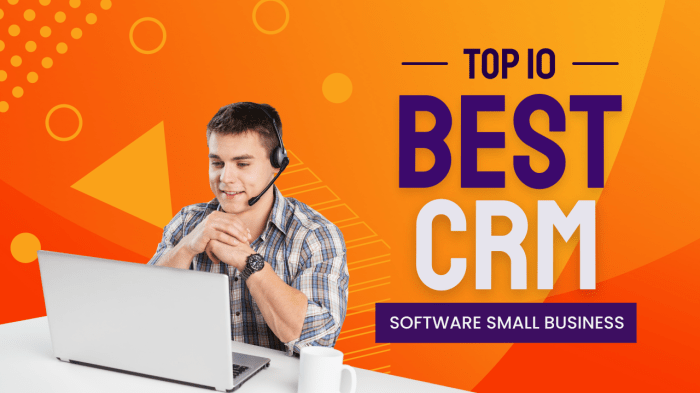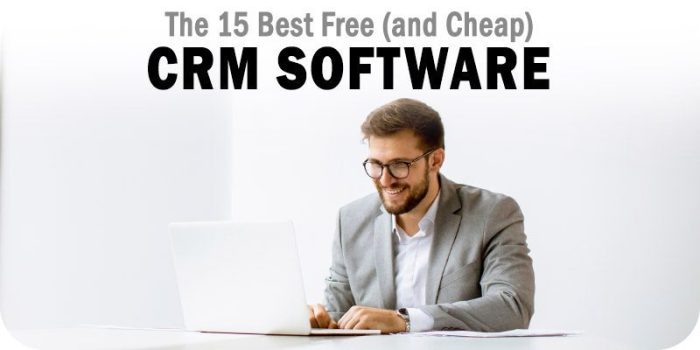Inexpensive crm software for small business – Finding the right Customer Relationship Management (CRM) software can feel overwhelming, especially for small businesses operating on a tight budget. Fortunately, numerous inexpensive and effective options exist, catering to various needs and scales. This comprehensive guide will explore the landscape of affordable CRM solutions, helping you choose the perfect fit for your business.
Understanding Your CRM Needs: Before You Start Searching
Before diving into specific software, it’s crucial to define your requirements. What are your primary goals for implementing a CRM? Are you aiming to improve customer service, streamline sales processes, manage marketing campaigns, or a combination of these? Consider the following factors:
- Number of users: How many people in your team need access to the CRM?
- Required features: Do you need contact management, sales pipeline tracking, email marketing integration, reporting and analytics, or customer support ticketing?
- Integration needs: Does your CRM need to integrate with other tools you use, such as email platforms (Gmail, Outlook), accounting software (Xero, QuickBooks), or marketing automation platforms (Mailchimp, HubSpot)?
- Budget: Determine a realistic budget to avoid overspending and ensure the software aligns with your financial capabilities. Consider both the initial cost and ongoing subscription fees.
- Scalability: Choose a CRM that can grow with your business. Will you need to add more users or features in the future?
Top Inexpensive CRM Software Options for Small Businesses
The market offers a diverse range of affordable CRM solutions. Here are some popular choices, categorized for clarity:

Source: oflox.com
Free and Freemium CRM Options
These options offer basic functionalities for free, with paid plans unlocking advanced features. They are ideal for startups and small businesses with limited budgets.
- HubSpot CRM: A powerful, free CRM with robust features, including contact management, deal tracking, and email integration. Paid plans offer more advanced capabilities like marketing automation and sales analytics. HubSpot CRM
- Zoho CRM: A comprehensive CRM with a generous free plan suitable for small teams. Paid plans provide access to more users, advanced features, and enhanced support. Zoho CRM
- Bitrix24: A versatile platform offering CRM functionalities alongside project management, communication, and collaboration tools. The free plan is quite feature-rich, making it attractive for smaller businesses. Bitrix24
Affordable Paid CRM Options, Inexpensive crm software for small business
These options offer more advanced features and support at a reasonable price point, often through monthly or annual subscriptions.
- Freshsales: A user-friendly CRM focusing on sales automation and productivity. It offers a competitive pricing structure suitable for small businesses. Freshsales
- Agile CRM: A comprehensive solution incorporating sales, marketing, and service features. It offers flexible pricing plans catering to different business sizes and needs. Agile CRM
- Pipedrive: A sales-focused CRM known for its intuitive interface and ease of use. It prioritizes sales pipeline management and provides clear reporting. Pipedrive
Key Features to Look For in Inexpensive CRM Software
While budget is a key factor, don’t compromise on essential features. Here are some crucial aspects to consider:
- Contact Management: Efficiently store and manage customer information, including contact details, communication history, and purchase records.
- Sales Pipeline Management: Track leads, opportunities, and deals throughout the sales process, visualizing progress and identifying bottlenecks.
- Email Integration: Seamlessly integrate with your email client to manage communications directly within the CRM.
- Reporting and Analytics: Generate reports and dashboards to track key metrics, analyze performance, and make data-driven decisions.
- Customer Support Ticketing: Manage customer inquiries and resolve issues efficiently, improving customer satisfaction.
- Mobile Accessibility: Access your CRM from anywhere, anytime, through a mobile app.
- Customization and Integrations: The ability to tailor the CRM to your specific needs and integrate with other business tools is vital for seamless workflow.
Choosing the Right Inexpensive CRM: A Step-by-Step Guide
- Assess your needs: Clearly define your business requirements and goals for using a CRM.
- Research different options: Explore the various CRM solutions mentioned above and others available in the market.
- Compare features and pricing: Create a comparison table to evaluate the features and pricing of different CRMs.
- Check for reviews and testimonials: Read user reviews and testimonials to understand the experiences of other businesses.
- Try free trials or demos: Most CRMs offer free trials or demos, allowing you to test the software before committing to a paid plan.
- Consider scalability: Choose a CRM that can adapt to your business’s growth and evolving needs.
- Implement and train your team: Once you’ve chosen a CRM, ensure your team is properly trained on its use.
Frequently Asked Questions (FAQ): Inexpensive Crm Software For Small Business
- Q: What is the difference between a free and paid CRM? A: Free CRMs usually offer limited features and support, while paid CRMs provide more advanced functionalities, greater scalability, and dedicated customer support.
- Q: How much does inexpensive CRM software cost? A: Prices vary widely depending on the features, number of users, and provider. You can find options ranging from free plans to a few hundred dollars per month.
- Q: Can I switch CRM software if I’m not satisfied? A: Yes, you can usually switch to another CRM, but data migration can be complex and time-consuming. Choose carefully to minimize disruption.
- Q: Do inexpensive CRMs offer good customer support? A: The level of customer support varies. Some offer extensive support, while others might have limited options. Check reviews and the provider’s support offerings before committing.
- Q: What are the benefits of using a CRM for a small business? A: A CRM helps improve customer relationships, streamline sales processes, increase efficiency, boost productivity, and provide valuable data-driven insights for better decision-making.
Conclusion
Choosing the right inexpensive CRM is crucial for small business success. By carefully considering your needs, researching available options, and following the steps Artikeld above, you can find a solution that empowers your business to grow and thrive. Don’t hesitate to leverage free trials and demos to make an informed decision.
Call to Action
Ready to boost your business efficiency and customer relationships? Start exploring the affordable CRM options discussed in this guide and find the perfect fit for your small business today!
Questions Often Asked
What are the key features to look for in inexpensive CRM software?
Essential features include contact management, lead tracking, sales pipeline management, reporting and analytics, and basic customer support tools. Consider integrations with email marketing and other business tools.
How much should I expect to pay for inexpensive CRM software?
Pricing varies widely, but many affordable options start around $10-$50 per user per month. Free plans with limited features are also available, but may not scale well with business growth.
Can inexpensive CRM software integrate with other business applications?
Many inexpensive CRMs offer integrations with popular applications like email marketing platforms, accounting software, and e-commerce platforms. Check the specific integrations offered before making a purchase.

Source: solutionsreview.com
What if my business needs grow beyond the capabilities of my inexpensive CRM?
Most affordable CRMs offer scalable plans. You can usually upgrade to a more powerful plan as your business expands and your needs evolve.
